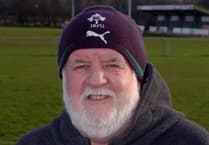TRIBUTES have been paid to a legendary round-the-world yachtsman who passed away on New Year’s Eve.
Pwllheli’s Richard Tudor was an inspirational figure in sailing and across a wide spectrum of interests in boats.
Tudor, who died at the age of 64 and leaves wife Falmai, was brought up in Pwllheli after being born in Llandrindod Wells, Powys.
He twice skippered vessels in the British Steel Global Challenge dubbed the ‘World’s Toughest Yacht Race’, taking on prevailing winds and currents in a 28,000-mile test of endurance.
Tudor, who also led expeditions to the Artic Circle and competed in regattas around the world, was a former club commodore at Clwb Hwylio Pwllheli Sailing Club and an active committee member.
Current commodore Mark H Thompson said: “On behalf of the flag officers and members of Clwb Hwylio Pwllheli Sailing Club, I have sent our heartfelt condolences to Falmai and the Tudor family, on the passing of Richard.
“He made such an incredible impact on all our lives. Rest in peace my friend.”
Richard started sailing at a very early age and built his first dinghy from kit in the living room at home. He competed in championships travelling from venue to venue with the red mirror dinghy, Madryn, on top of his mother’s Mini.
With his father Huw also a former commodore, sailing was in Richard’s blood and after serving an apprenticeship with North Sails he ventured into business by buying Pwllheli business Sail Care and running it as Tudor Sail Makers.
He sailed his first Irish Sea Offshore Racing Association event in 1976 with Anthony Jones and completed a Fastnet race in 1977 and 1981, with many more to follow. One on Panache with an all Pwllheli crew including his former tutor Gwyndaf Hughes.
But his dream was long distance offshore racing and he wanted to compete in the round the world Volvo Ocean Race.
His dream came true when he was offered the skipper role on British Steel, the flagship for the British Steel Global Challenge in 1992-93.
Things looked great, winning the first leg to Rio, a highlight of the stop-over a chance to meet Ronnie Biggs, the great train robber.
But disaster struck on the second leg as the fleet raced past Cape Horn. Just before Christmas, the mast came down because of a fault in the forestay fitting on the stem head. The rest of the fleet was alerted to the fault and many boats were fitted with new masts at the next stop-over.
The story of their 3,000 miles struggle to New Zealand/Australia is well documented. Fuel was replenished from a ship en-route. A stop in Chatham Islands where he was given a mast on condition that he dug it up from the ground in some scrub land. The much smaller mast was however lashed onto the remains of the boom that had been retrieved from the ocean.
What is not known, however, is Richard’s heroism being in the water for hours on end, cutting the rigging that was endangering the boat itself. The crew of British Steel continue to meet every year, on the anniversary of the dismasting over 30 years ago.
The next big adventure for Richard was as skipper of Nuclear Electric, another circumnavigation as skipper in 1996-97. He was the toast of the town when she was tied up to the pontoon on the marina. There were so many people wanting to see this fantastic vessel that the pontoon almost sank, and people had to be limited.
These two circumnavigations were massive achievements for a young man.
Richard then led expeditions to the Artic Circle and to many other warmer and more exotic places.
He was also part of the Team Phillips experimental trimaran which sank in the North Atlantic and he and the crew were rescued by a passing ship, just as the boat fell apart and sank. He ended up in Halifax, Nova Scotia.
He competed in Regattas around the world, was part of the Corwynt Cymru Team winning Cork Week and Round Ireland.
He still holds the record for the best time ever on his Three Peaks race win in 1998 and was a winning skipper on the Round Britain and Ireland race.
Richard opened the Pwllheli Marina in 1993, and the plaque is in the reception. He was a director of Porth Pwllheli, a consortium of local people wanting to develop Pwllheli into a world-renowned Marina.
It is maintained to this day that this forced the hand of Dwyfor Council to develop what is now known as Hafan Pwllheli.
He was asked to set up a new Marine College in Pwllheli – something he had campaigned for – and took a lecturer’s role passing on his marine engineering skills to students.
His anchor was now firmly ashore, and he met Falmai and they had a daughter Leus and son Iago.
Richard has been a member of Clwb Hwylio Pwllheli from the time of their very first building – they are now in their fifth home – and was commodore in 2000 to 2002 and president in 2006 to 2008.
He was instrumental in bringing the One Ton Cup to Pwllheli and worked tirelessly on the Academy project, which all started in 2003.
He was an active board member of Plas Heli and was involved with all aspects of its development.
He still enjoyed sailing until a few years ago, jumping at any opportunity to be on the water. He was a member of the Jackknife team on that fantastic race from Dun Laoghaire to Dingle where top speeds were achieved on the spinnaker run down to Tuskar.
In a tribute, to mark his 2021 Lifetime Contribution award, the club wrote: “What you get with Richard on the boat is great seamanship, he can spot a problem and fix it before it becomes a drama.
“It is fantastic to see Iago and Richard sailing together. It is extraordinary to have three sets of father and sons, Andrew and Sam, Richard and Iago and Stephen and Thomas, all competing together on the same boat – truly memorable!
“His contribution to our sailing and boating is phenomenal, what we take for granted would not be possible without the work that Richard does.”
Famous yachtsman Sir Chay Blyth explained: “He was an inspirational leader, deeply respected and loved by his crew. They suffered one of the ultimate misfortunes in a yacht race of losing their mast in the Southern Ocean at a point virtually the furthest from land of anywhere on the planet. In adversity the true mettle of people comes out. When the rigging needed cutting from the yacht it was Richard who went over the side with bolt cutters to free the debris from the yacht. Richard had the technical expertise to know what had to be done.
“He got the yacht and all his crew back safely from the depths of the Southern Ocean safely to the Chatham Islands and then on to Wellington.
“A truly remarkable and outstanding sailor.”





Comments
This article has no comments yet. Be the first to leave a comment.